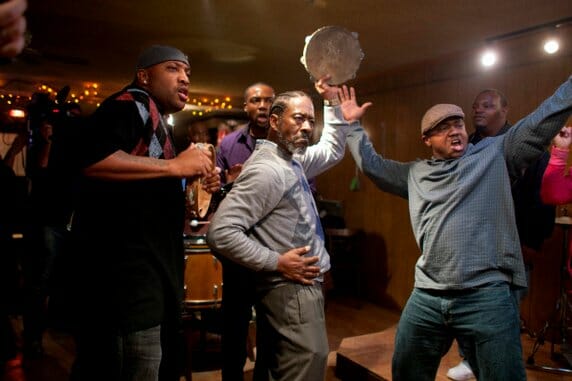Treme: “The Greatest Love” (Episode 3.4)

What various corrupt police officers did during the flood has been part of Treme since its very beginning, though it’s been simmering slowly. “The Greatest Love” manages to give this storyline some real heat by bringing tension to its characters. With both Everett and the Bernette family being followed, it feels like perhaps they may make some headway. But despite all of this, the investigation and these characters remain the least interesting parts of the show.
Everett’s addition makes sense given that he’s based on a real character, but unlike for instance Nelson Hidalgo, the show’s most important new character from season two, he doesn’t have any real nuance. He’s a crusader, and the full extent of his personality seems to be that he likes heavy metal. Chris Coy does his best giving this pretty blank persona some life, but his do-gooder traits really outweigh the rest of his character. I’d like to see the character become more complex, but this really looks unlikely, and is rather strange in a way. However, many of the journalists in season five of The Wire (with the notable exception of Gus) felt similarly stilted and only half-real, and it seems as if Simon really doesn’t know what to do with them.
The one other demerit in this otherwise excellent episode also came from the Bernettes, when Sofia and her mother watched “a Samuel Beckett play” as Sofia put it in a weird, not-quite human method for someone who’d already read the play. The heavy-handedness of this performance felt so much at odds with what Simon does right that I just cringed through the performance, especially when it made Tony cry. This felt too easy, a metaphor too explicit for a show of this intelligence. Yes, this performance really happened, and I can understand the temptation to use it considering that its cast included Treme’s own Wendell Pierce, but it’s something that should’ve been resisted. Not everything from the city’s recent past needs to be used, and this just didn’t work, as exciting as the actual performances they recreated probably were.
-

-

-

-

-

-

-

-

-

-

-

-

-

-

-

-

-

-

-

-

-

-

-

-

-

-

-

-

-

-

-

-

-

-

-

-

-

-

-

-








































